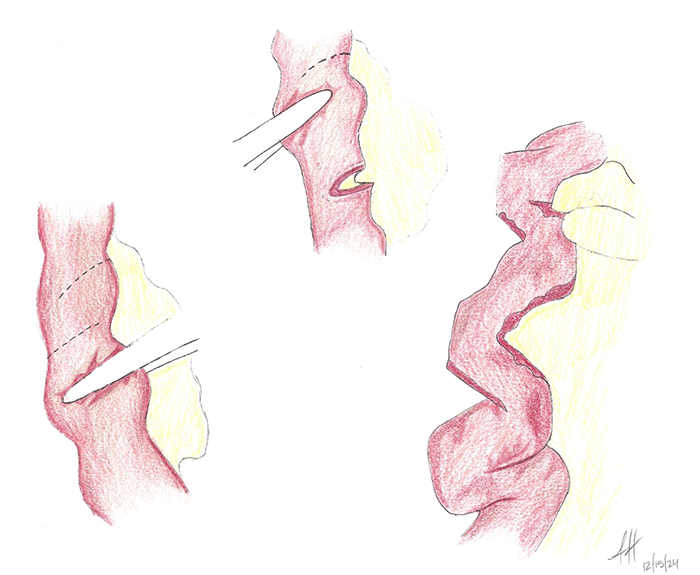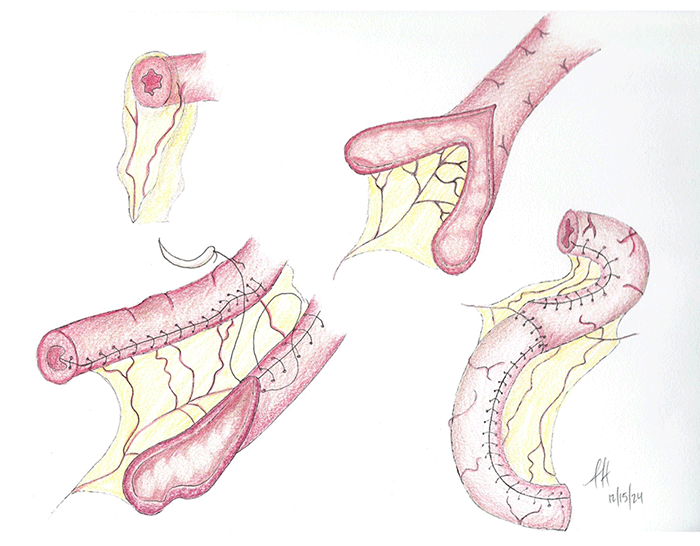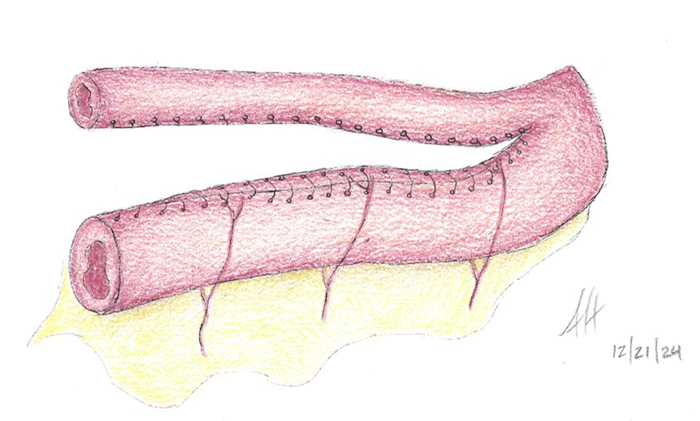Intestinal & Multiorgan Transplant Program
On Page Nav:
Intestinal failure (IF) is a condition that occurs when the small intestine cannot absorb enough nutrients and water to meets the body’s needs. This may result from either loss of intestinal length or the presence of malfunctioning intestine. Patients with IF know that this can be a challenging condition, requiring daily access to IV nutrition and hydration and increased risk for frequent infections, blood clots, malnutrition, and liver disease.
We are here to bring hope to these patients. Hope for a better life. Hope for a cure.
Our Intestinal and Multiorgan Transplant Program has over two decades of experience helping those suffering from serious intestinal or abdominal conditions. We have successfully treated hundreds of patients and have been recognized for our numerous surgical advancements. Our program offers:
- Comprehensive Services: We have specialists in pediatric surgery and transplantation, gastrointestinal medicine and nutrition, advanced practice nursing, social support services, and more. This range of services is only available at a world-leading hospital.
- Extensive Experience: Our surgeons have performed hundreds of intestinal operations, including complex multivisceral transplants involving four or more organs. As leaders and innovators in the field, we are prepared to meet your needs.
- Quality Care: We go beyond just your medical needs to make your experience with us as easy as possible. At every step, we communicate with you, answer your questions, and are available for advice and support. We are committed to your care.
No matter your needs, we can help you become healthy again. To get more information, meet our staff, or schedule an appointment, call us at (877) 548-3763 or fill out our online request form to get started.
Conditions We Cover
Intestinal and multiorgan transplantation surgery can be used to treat a variety of conditions. The most common are intestinal failure due to short bowel syndrome and liver failure associated with TPN (nutrition delivered via veins rather than the GI tract) . Others conditions include:
- Blocked or obstructed intestines (atresia)
- Crohn’s disease
- Desmoid tumor with intra-abdominal infiltration
- End stage liver disease (cirrhosis)
- Endocrine tumors
- Gardner's syndrome
- Gastroschisis
- Hirschsprung's disease
- Infiltrative diseases leading to intestinal failure (sarcoidosis or amyloidosis)
- Megacystis microcolon intestinal hypoperistalsis syndrome (MMIHS)
- Mesenteric venous thrombosis or arterial thrombosis
- Microvillus inclusion disease
- Multiple resections and explorations
- Necrotizing enterocolitis
- Severe cholestasis induced by total parental nutrition (TPN-IC)
- Short bowel syndrome
- Vascular abdominal trauma
- Volvulus
Learn more about intestinal failure and its causes
Treatments We Offer
Patients with intestinal failure may be candidates for intestinal rehabilitation or intestinal transplantation. At Columbia, we perform the full range of medical and surgical treatments for both intestinal rehabilitation and intestinal transplantation.
Medical Treatments
Our multidisciplinary approach to treating intestinal failure includes:
- Central catheter management
- Treatment with Gattex
- TPN (Total Parenteral Nutrition) management to prevent liver injury
- Special short gut diet
- Optimization of antisecretory and antimotility agents
To find out more about pediatric medical management of intestinal failure, visit our Pediatric Intestinal Rehabilitation Program.
Surgical Treatments
There are several different types of intestinal and multiorgan transplantation procedures. Which one you receive will depend on the cause of your condition and any related complications.
- Isolated Intestinal Transplant: Removes the diseased portion of the small intestine and replaces it with a healthy donor small intestine. This type of transplant is given to patients who have complications caused by intestinal failure, but do not have liver failure.
- Multivisceral Transplant: Removes multiple diseased organs and replaces them with healthy donor organs. This type of transplant is given to patients who have multiple organ failure, including stomach, pancreas, liver, small intestine, and/or kidney failure.
- Modified Multivisceral Transplant: Involves keeping your own liver while removing the remaining diseased organs and replacing them with healthy donor organs. This type of transplant is given to patients who do not have liver disease or failure, but do have organ failure of the stomach, pancreas, small intestine, and/or kidney.
- Ex Vivo Surgery: Removes as many as six abdominal organs in order to excise tumors that have grown around these organs and/or their blood vessels, and then reimplants these same organs back into the body.
We also have extensive experience with surgically managing enterocutaneous fistula. Our surgical treatments for enterocutaneous fistula include
- Ostomy closure
- Bowel lengthening procedure, such as the STEP (Serial Transverse Enteroplasty) procedure and the Bianchi procedure
- Bowel tapering



Learn more about intestinal & multivisceral transplantation and ex vivo surgery
Our Team
We pair doctors across several fields with a team of nurses, care workers, and other medical specialists so that we can provide you with comprehensive care.
Once you are referred to us, you will be evaluated by the surgical team, the medical team (gastroenterology, infectious disease, cardiology), social workers, and dietitians. A dedicated coordinator will shepherd you through the process. We will perform all of the necessary testing to ensure that we can treat you safely and effectively. Sometimes the evaluation process can take some time, which is important to make sure that we give you the best possible care. We are very careful and deliberate in our process for your safety.

Tomoaki Kato, MD
Chief, Division of Abdominal Organ Transplant and Hepatobiliary Surgery
Surgical Director, Liver and Gastrointestinal Transplantation

Mercedes Martinez, MD
Medical Director, Adult and Pediatric the Intestinal/Multivisceral Transplant Program

Jason Hawksworth, MD
Chief, Hepatobiliary Surgery
Director, Robotic Liver Surgery Program
Surgical Director, Adult Liver Transplant Program

Joshua Weiner, MD
Transplant Surgeon (Intestinal, kidney, and pancreas transplant)
Transplant Immunologist

Amanda Cantor, MD
Transplant Hepatologist

Carolyn Newberry, MD
Gastroenterologist

Anna West, MPAS, PA-C
Physician Assistant

Monica L. Velasco, DNP, FNP-C
Nurse Practitioner

Emmanuel Serrano, RN
Registered Nurse

David Seres, MD, SCM
Director, Medical Nutrition

Sabrina Oliver, MS, RD, CSO, CDN
Digestive Disease Dietitian
Resources and Guides
Learn more about intestinal and multivisceral transplantation surgery:
- Intestinal Failure
- Ex Vivo Surgery
- Intestinal & Multivisceral Transplantation
- FAQs About Liver Transplants
- Psychosocial Resources for Transplant Patients
Our Location
CUIMC/Presbyterian Hospital and Vanderbilt Clinic
622 W. 168th St., 14th floor
New York, NY 10032
Make An Appointment
If you’ve been diagnosed with intestinal failure or been told you may need an intestinal transplant, we can help. We accept a number of insurance plans and our team can help confirm your coverage. Call 877-548-3763 or complete our online appointment request form.
